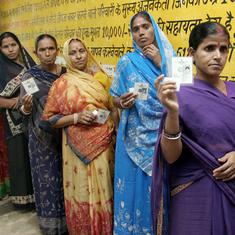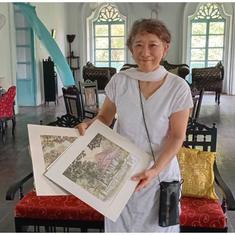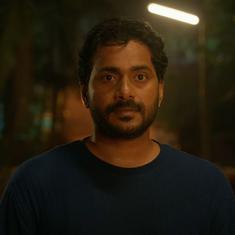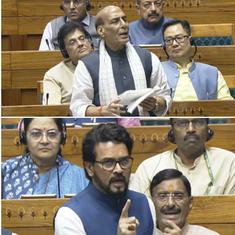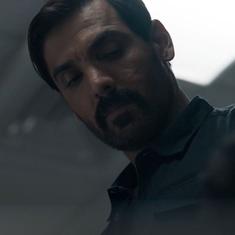Saturday night, suburban Gurgaon. The sky turns from blue to black, the burnt-toast smell of fireworks blows across the ravine, and tall, broad-shouldered Varsha hauls a hot-coal iron over the shimmering finery of others.
Quietly, quickly, she presses the wrinkles out of a brushed pink chiffon salwar-kameez, another the colour of nimboo-pani, followed by three button-down white dress shirts. Her cellphone trills. “Yes, didi. It’s almost ready. Send your driver in ten minutes.”
Didi is a customer with a wedding to attend, perhaps several, since it is wedding season, and many didis around town have many weddings to attend. Firecrackers begin to boom-snap in the distance. They will go on past midnight. It is Varsha’s job to make sure didis don’t show up to their parties all rumpled.
And so she presses their clothes, places them on hangers, one after the other, futt-a-futt, racing against the clock. Left hand on cloth, right hand on iron, she removes every crease, every wrinkle. If only she could press away her worries this way, I think.
Varsha is seventeen, every bit the dreamer. She too is born to a family of modest means. She too wants to rise. The difference is that Varsha is a girl, and she doesn’t have a mother willing to move mountains for her.
And so Varsha tries to move mountains herself. She aspires to go to college and to one day be financially independent. She dreams of being a cop, gold stars on her shoulders, capable of protecting herself from the louts out there who harass and abuse girls. This conviction becomes all the more urgent after her country is roiled by the gang-rape of a young woman in late 2012.
Varsha finds beauty in Kathak. For a while, she fantasises about learning to play the guitar. In her head, day and night, she hears a hot, impatient voice: I am not bound by my past. I make me.
She is one among many.
Varsha’s ambitions alternately bemuse her father and make him sick with worry. There is no question of her becoming a cop, as far as he is concerned. By the time she is twenty, he intends to find her a husband – from a good family, of course from the same caste, with a capacity to earn and protect his child. If the in-laws allow, she can work. Kathak lessons are out of the question. Likewise, guitar. It will not improve her marriage prospects.
Varsha regards her papa as her ally, but he is also her obstacle. He loves her but he also sabotages her. He too wants her to break free of her past – but not too much. She keeps pushing the bounds, and he has to figure out how far to let her go.
Papa agrees to let her finish high school, but mainly to improve her marriage prospects. He knows only louts will marry a girl without a high school degree nowadays.
By the time she is fourteen, which is when I first meet her, in the winter of 2010, she and her mother do most of the pressing. Her younger sisters, Neetu and Megha, pick up and deliver. Badal, the first son in the family, born after three daughters, mostly plays. The baby suckles at his mummy’s breast.
Varsha juggles the pressing among her many other obligations. It falls on her to roll chapatis every evening, dozens of them, one after the other – and so many do they all eat, her family of seven, that by the time she is done, she has little energy left for homework. She worries about exams. She worries about the useless government school where Badal and Megha are enrolled. She worries about a useless boy she likes, who has no ambition to speak of, but whom she talks to quietly on her cell phone every night. She worries that if she keeps on with it, there will be terrible consequences. “Papa will kill me,” she says.
Varsha’s father takes his responsibilities seriously. He tries to protect her from harm. At the same time, he is the chief enforcer of the very traditions that circumscribe her dreams. He keeps putting up fences around her. He keeps stopping her from becoming who she can be.
“I have been pressing clothes all my life,” he says once. “The main thing I want for my children is that they do something better.”
It is a bland answer to a bland question about his hopes for Varsha, but it fills Varsha’s eyes with tears to hear her father speak this way. She turns around and buries her head on his shoulder, which catches him by surprise. He awkwardly pats her on the back.
He is pleased with her progress at school, but not always. He worries she is becoming too independent. “She is growing wings,” he once complains to her school principal. “She’s talking back.”
Varsha pushes the limits, finds herself pushed back, pushes some more. She is a child in an impossible situation. She has gulped the Kool- Aid of aspirational India. Deep inside, she believes she can make something of herself. She is convinced school is her best exit strategy. And so she has risen to all its demands: studied, scored well on the critical exams, become captain of the girls volleyball team. She has risen to the demands of family too: hung towels to dry, helped with dinner, made sure her siblings do their homework, made sure Mummy takes her medicines, and smoothed out crease after crease after crease. Not a child and still a child.
I get Varsha. She is like so many girls I have known. Obedient and dutiful, we keep our heads down and do as we’re told. We mostly follow the rules, but we dream of escape. Despair catches us when we least expect it, and we wonder why.
Violence against girls seems to preoccupy Varsha’s papa. He hears terrifying stories about what happens to girls who are in the wrong place at the wrong time.
He tells me about a barber’s daughter, no more than five years old, who had gone to a temple for a free meal, only to be abducted by a man, raped, and dumped at a traffic circle nearby. Every time he drives by that traffic circle, and usually it is several times a day, it makes him shudder to think of a girl raped and dumped like that.
He is exceptionally protective. He doesn’t let Varsha walk home from the press stand after dark. Even in the middle of the afternoon, when Varsha gets out of school, he doesn’t let her go anywhere – neither to a friend’s house, nor to a neighbourhood study hall. Nowhere but straight to the press stand. He demands that she call him as soon as she gets there, and that better be by 2:20 pm, which is exactly how long it takes her to walk from school. The streets are not safe, he says. They are especially not safe for Varsha, who is by now tall and curvy, as full of adventure and desire as only a teenaged girl can be.
Varsha grows into a young woman at a time when the safety of women and girls takes centre stage in the public life of her country. It fills her father with foreboding, and he tries to rein her in even more. And it makes her all the more determined to become a cop.
It suits her personality, she tells me. “I’m like a boy at school,” she says, by which she means that unlike other girls, she never asks boys to help her, say, lift a heavy chair in the classroom. She is usually the one helping others. “I’m independent. I can do my work. My nickname at school is ‘Proactive.’”
It’s true. She’s bossy – in a really good way. A girl born to more privilege might be described as a leader. Fearless and tough.
Excerpted with permission from The End of Karma: Hope And Fury Among India’s Young, Somini Sengupta, HarperCollins India.

